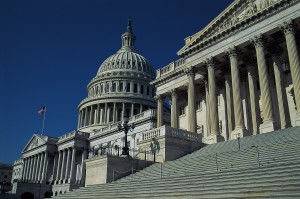 Miami, Florida-based lender and financial services company Hencorp Becstone Capital LC (“Hencorp”) has agreed to pay $3.8 million to settle allegations that it violated the False Claims Act in connection with an elaborate scheme to defraud the Export-Import Bank of the United States. The Export-Import Bank, founded in 1934, is the official export credit agency of the federal government that guarantees loans made by approved lenders to foreign companies for use in purchasing American-made products. Hencorp, acting through its regional director Ricardo Maza, procured candidates in Latin America for participation in the loan guarantee program of the Bank. Hencorp allegedly approached business in Latin America and offered to help them make an application to the Bank for inclusion in the program, and then offered to make a the loan to such businesses if the Export-Import Bank approved them for the loan guarantee. The applications were false because Hencorp did not intend to provide a loan but instead planned to divert the loan funds. Continue reading ›
Miami, Florida-based lender and financial services company Hencorp Becstone Capital LC (“Hencorp”) has agreed to pay $3.8 million to settle allegations that it violated the False Claims Act in connection with an elaborate scheme to defraud the Export-Import Bank of the United States. The Export-Import Bank, founded in 1934, is the official export credit agency of the federal government that guarantees loans made by approved lenders to foreign companies for use in purchasing American-made products. Hencorp, acting through its regional director Ricardo Maza, procured candidates in Latin America for participation in the loan guarantee program of the Bank. Hencorp allegedly approached business in Latin America and offered to help them make an application to the Bank for inclusion in the program, and then offered to make a the loan to such businesses if the Export-Import Bank approved them for the loan guarantee. The applications were false because Hencorp did not intend to provide a loan but instead planned to divert the loan funds. Continue reading ›
Articles Posted in Lending Fraud
LIBOR Rate-Rigging Scandal May Have False Claims Act Implications
 After Barclay’s agreed to pay a $450 million criminal fine following an investigatory probe conducted by the Department of Justice, regulators in countries all over the world continue to evaluate the full scope and impact of the LIBOR (London Interbank Offered Rate) rate manipulation scandal. Barclay’s admitted to manipulating the short-term interest rate it was able to secure for overnight loans; the average of banks’ self-reported overnight rates is used to calculate the LIBOR rate. The United States Department of Justice, the Commodities Future Trading Commission, and other regulatory agencies worldwide have portended the possibility of criminal prosecutions implicating, at a minimum, ten large banks. The LIBOR benchmark affects borrowing costs for trillions of dollars’ worth of financial instruments, including mortgages, credit cards, and student loans.
After Barclay’s agreed to pay a $450 million criminal fine following an investigatory probe conducted by the Department of Justice, regulators in countries all over the world continue to evaluate the full scope and impact of the LIBOR (London Interbank Offered Rate) rate manipulation scandal. Barclay’s admitted to manipulating the short-term interest rate it was able to secure for overnight loans; the average of banks’ self-reported overnight rates is used to calculate the LIBOR rate. The United States Department of Justice, the Commodities Future Trading Commission, and other regulatory agencies worldwide have portended the possibility of criminal prosecutions implicating, at a minimum, ten large banks. The LIBOR benchmark affects borrowing costs for trillions of dollars’ worth of financial instruments, including mortgages, credit cards, and student loans.
Dozens of cities, states, and other government entities are already exploring whether they suffered losses as a result of the alleged rate manipulation. Practices which affected the LIBOR by even fractions of one percent, experts estimate, could impact investors to the tune of tens of millions of dollars. The City of Baltimore has filed a lawsuit, which has been consolidated with those of dozens of others, alleging losses from the banking fraud; entities suing include pension funds, mutual funds, and municipalities.
While the scale and nature of the losses as a result of the LIBOR scandal are as of yet not possible to fully fathom, the potential impact on mortgage rates and other financial instruments could lead to qui tam suits under the False Claims Act (“FCA”), a whistleblower statute that allows whistleblowers a private cause of action against entities that have defrauded the government. If depository institutions misrepresented the interest rates on loans insured by the Federal Housing Administration (FHA), there could be potential liability under the FCA.
SEC Sets Aside $452 Million for Whistleblower Rewards
 A mandated Securities Exchange Commission (SEC) whistleblower program, instituted as part of the Dodd-Frank Wall Street Reform Bill, reached its one year anniversary this week with a reported fund of $452 million set aside to pay out the first year’s rewards.
A mandated Securities Exchange Commission (SEC) whistleblower program, instituted as part of the Dodd-Frank Wall Street Reform Bill, reached its one year anniversary this week with a reported fund of $452 million set aside to pay out the first year’s rewards.
Whistleblowers may receive between 10% and 30% of the SEC’s recovery as an incentive for providing information in connection with potential securities fraud to the SEC. The program has already led to a veritable flood of tips from prospective relators on a daily basis, two to three of which on any given day are deemed worthy of further investigation.
The SEC program is similar in design to the federal False Claims Act (FCA), a whistleblower statute that has been on the books since 1863. Under the FCA, relators have standing to bring suit against individuals and corporations which have allegedly submitted false claims for payment to the government. It is also a violation of the FCA to submit a false claim in order to avoid payment of a liability owed to the government. Since 1986, the False Claims Act has undergone myriad amendments that, taken together, have worked to expand the protections available to whistleblowers and increase the number of valid claims under the statute. For example, the passage of the Fraud Enforcement and Recovery Act (FERA) in 2009, the Dodd-Frank Wall Street Reform Bill in 2010, and the Patient Protection and Affordable Care Act (PPACA) in 2010 all increased the scope of liability under the law. The 2009 changes to the law also included a broadening of the anti-retaliation provisions, expanding coverage to include not only employees, but also contractors and agents who make “lawful efforts to stop” violations of the FCA.
Will Hedge Funds Invest in Whistleblower Cases?
 Third party litigation has recently been a hot topic in the U.S., spurring speculation as to whether hedge funds will similarly begin funding whistleblower cases. A recent article on Pharmalot suggests that this leap may be likely and points out that whistleblower cases may be prime targets for investors, because they often suffer financing problems during long periods of litigation but may also result in nine figure settlements. Continue reading ›
Third party litigation has recently been a hot topic in the U.S., spurring speculation as to whether hedge funds will similarly begin funding whistleblower cases. A recent article on Pharmalot suggests that this leap may be likely and points out that whistleblower cases may be prime targets for investors, because they often suffer financing problems during long periods of litigation but may also result in nine figure settlements. Continue reading ›
SEC Whistleblower Program Generates Fierce Debate
 When the SEC released proposed whistleblower regulations required under Dodd-Frank, they requested comments from the public. In response, Arent Fox, a law firm that represents Wal-Mart and drugmakers Elan and Genzyme, recently sent a letter to the SEC. In it, the firm advocated that the SEC first require employees to explore internal corporate compliance procedures before turning to the SEC. Additionally, the letter also requested a “no-bite” strategy in which the SEC refuses to accept tips from those with a fiduciary responsibility to the company, including top officers and directors. Continue reading ›
When the SEC released proposed whistleblower regulations required under Dodd-Frank, they requested comments from the public. In response, Arent Fox, a law firm that represents Wal-Mart and drugmakers Elan and Genzyme, recently sent a letter to the SEC. In it, the firm advocated that the SEC first require employees to explore internal corporate compliance procedures before turning to the SEC. Additionally, the letter also requested a “no-bite” strategy in which the SEC refuses to accept tips from those with a fiduciary responsibility to the company, including top officers and directors. Continue reading ›
SEC Whistleblower Update: Comments Welcomed by Agency
According to Dodd-Frank legislation, the SEC is required to adopt regulations regarding its whistleblower program no later than April 21 2011 (nine months from enactment). According to a recent report released by the SEC, the agency has set aside about $450 million for future payments to whistleblowers whose information results in successful cases and penalties.
The SEC is currently soliciting comments on how the proposed whistleblower program may best co-exist with current corporate compliance programs. Comments may be submitted via the SEC’s online form here. Continue reading ›
Green Mountain Coffee Faces SEC Fraud Suit
A securities fraud class-action lawsuit has been filed against Green Mountain Coffee Roasters Inc. in U.S. District Court in Vermont. The suit was originally brought by a whistleblower alleging accounting irregularities. Under the Dodd-Frank Wall Street Reform and Consumer Protection Act, the SEC may award between 10 percent and 30 percent of more than $1 million to any whistleblower providing “original information” leading to a successful SEC enforcement. Continue reading ›
Merck Violates Foreign Corrupt Practices Act
New whistleblower provisions in the recently passed Dodd-Frank Act enable whistleblowers to receive rewards for reporting violations of the Foreign Corrupt Practices Act (FCPA). The FCPA prohibits bribery of foreign government officials in international business transactions and false entries in books and records of those companies within the statute. Whistleblowers assisting in a recovery receive a monetary award between 10-30%. Continue reading ›
Bank Chief Accused of TARP Fraud
Charles J. Antonucci, Sr., former President and Chief Executive Officer of Park Avenue Bank is the first to be criminally charged for attempting to defraud the Troubled Asset Relief Program (“TARP”). The case was unsealed in March in the southern district court of Manhattan.
Agents of the Special Inspector General for TARP (“SIGTARP”) participated in the investigation, a enforcement agency resulting from the recently passed Financial Fraud Enforcement Task Force established in November 2009. Continue reading ›
SEC Pays Whistleblowers $1 Million
With the passage of the Dodd-Frank Act (AKA the Financial Reform Bill), the SEC now has more power to reward whistleblowers who report securities law violations with substantial payments. The first of these rewards came on July 23rd when Karen and Glen Kaiser of Connecticut received $1 million for their assistance in proving insider trading allegations against Pequot Capital Management, one of its employees, and a former Microsoft employee. Continue reading ›
 Whistleblower Attorneys Blog
Whistleblower Attorneys Blog

